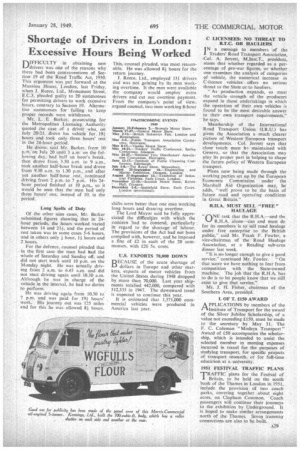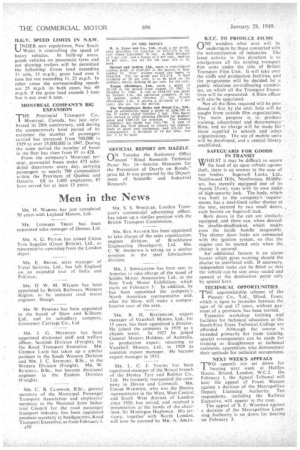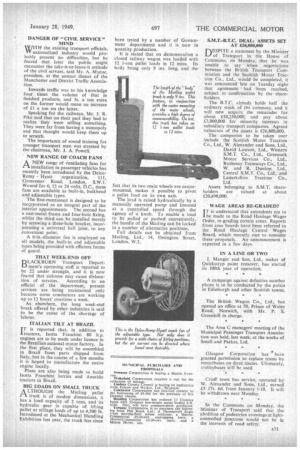Shortage of Drivers in London: Excessive Hours Being Worked
Page 5

Page 6

Page 7

If you've noticed an error in this article please click here to report it so we can fix it.
, a DIFFICILJLTY in obtaining new 1--"drivers was one of the reasons why there had been contraventions of Section 19 of the Road Traffic Act, 1930. This argument was put forward at the Mansion House, London, last Friday, when J. Reece, Ltd., Monument Street, E.C.3, pleaded guilty to 20 summonses for permitting drivers to work excessive hours, contrary to Section 19. Alternative summonses for failing to keep proper records were withdrawn.
Mr. L. E. Barker, prosecuting for the Metropolitan Licensing Authority quoted the case of a driver who, on July 20-21, drove his vehicle for 191 hours and took only three hours' rest in the 24-hour period.
He drove, said Mr. Barker, from 10' p.m; on July 20 until 3 a.m. on the following day. had half an hour's break, then drove from 3.30 a.m. to 9 a.m., took another half-hour break and drove from 9.30 a.m. to 1.30 p.m., and after yet another half-hour rest, continued driving from 2 p.m. to 7 pin. His 24hour period finished at 10 p,m„ so it would be seen that the man had only three hours' rest, instead of 10, in the period.
Long Spells of Duty Of the other nine cases, Mr. Barker submitted figures showing that in 24'hour periods, the hours worked varied between 14 and 21k, and the period of rest taken was in some cases 5-6 hours, and in others only f hour, 11 hours and 2 hours.
For the defence, counsel pleaded that in the first case the man had had the whole of Saturday and Sunday off, and did not start work until 10 p.m. on the Monday night. He was actually driving from 2 a.m. to 6.45 a.m. and did not start driving again until 10.30 a.m. Although he was in charge of the vehicle in the interval, he had no duties to perform.
He was driving again from 10.30 to 7 p.m. and was paid for 19f hours' work. His journey out was 125 miles and for this he was allowed 81hours. This, counsel pleaded, was most reasonable. He was allowed 8f hours for the return journey.
J. Reece, Ltd., employed 131 drivers and was not gaining by its men working overtime. It the men were available the company would employ extra drivers and cut out overtime payment. From the company's point of view, argued counsel, two men working 8-hour
shifts were better than one man working long hours and drawing overtime, The Lord Mayor said he fully appreciated the difficulpes with which the concern had to contend, particularly in regard to 'the shortage of labour. The provisions of the Act had not been complied with, however, and he imposed a fine of £2 in each of the 20 summonses, with £26 55. costs.
U.S. EXPORTS 70,000 DOWN
BECAUSE of the acute shortage of dollars in Europe and other markets, exports of motor vehicles from the United .States during 1948 dropped by more than 70,000. Last year shipments totalled 442,000, compared with 512,333 in 1947. The downward trend is expected to continue this year.
It is estimated that 1,371,000 commercial vehicles were produced in America last year. C LICENSEES: NO THREAT TO B.T.C. OR HAULIERS
IN a message to members of the
Traders' Road Transport Association, Col. A. Jerrett, Minst.T., president, states that whether regarded as a percentage of pre-war figures, or whether one examines the analysis of categories of vehicle, the numerical increase in C-licence vehicles offers no serious threat to the State or to hauliers.
"As production expands, so must the vehiclestrength of the producers expand in those undertakings in which the operation of their own vehicles is found to be the most desirable answer to their own transport requirements," he says.
Membership of the International Road Transport Union (I.R.U.) has given the Association a much clearer picture of Western 'European transport developments. Col. Jerrett says that close touch must be maintained with Geneva, so that the Association may play its proper part in helping to shape the future policy of Western European transport.
Plans now being made through the working parties set up by the European Economic Commission under the Marshall Aid Organization may, he adds, "well prove to be the basis of future road and operating conditions in Great Britain."
R.H.A. MUST SELL "FREE" HAULAGE
.'ONE task that the R.H.A.—and the R.H.A. alone—can and must do for its members is to sell road haulage under free enterprise to the British public,said Mr. Frank F. Fowler, a vice-chairman of the Road Haulage Association, at a Reading sub-area dinner last week.
"It is no longer enough to give a good service," continued Mr. Fowler. "On that score we have nothing to fear from competition with the State-owned machine. The job that the R.H.A. has to do is to let people know that we still exist to give that service."
Mr. J. H. Fisher, chairman of the Southern Area, presided.
I. OF T. E150 AWARD .
A PPLICATIONS by members of the r-LInstitute of Transport for the award of the Silver Jubilee Scholarship, of a value not exceeding £150, must be made to the secretary by May 31. The F. C. Coleman "Modern Transport" Award of £50 accompanies the scholarship, which is intended to assist the selected member in meeting expenses incurred in travel for the purposes of studying transport, for specific projects of transport research, or for full-time education at a university.
1951 FESTIVAL TRAFFIC PLANS 'TRAFFIC plans for the Festival of 1 Britain, to be held on the south bank of the Thames in London in 1951, include the provision of two coach parks, covering together about eight acres, on Clapham Common. Coach passengers will continue their journeys to the exhibition by Underground. It is hoped to make similar arrangements north of the Thames. Seven tramway connections are also to be built. H.G.V. SPEED LIMITS IN N.S.W.
UNDER new regulations', New South Wales is controlling the speed of heavy vehicles. In built-up areas. goods vehicles on pneumatic tyres and not drawing trailers will be permitted the follov7fing: Gross load exceeding ii tons. 15 m.p.h.; gross load over 6 tons but not exceeding 11, 25 m.p.h. In other areas the corresponding speeds arc 25 m.p.h. 'in both cases. but 40 m.p.h. if the gross load exceeds 3 tons hut is not over 6 tons. •
MONTREAL COMPANY'S BIG EXPANSION
THE Provincial Transport Co., Montreal. Canada, has just celebrated its 20th anniversary, and during the comparatively brief period of its existence the number of passengers carried has increased from 760,000 in 1929 to over 25,000.000 in 1947. During the same period the number of buses in the fleet has risen from 97 to 428.
From the company's Montreal termini, provincial buses make 475 -scheduled departures every day, carrying passengers to nearly 700 communities within the Provinces of Quebec and Ontario. Of its 1,405 employees, 87 have served for at least 15 years.
OFFICIAL REPORT ON DAZZLE
ON Tuesday the Stationery Office issued "Road Research Technical Panel. No 14—Interim Measures for
• the Prevention of Dazzle on Roads," price 6d. It wasprepared by the Department of Scientific and Industrial Research. B.T.C. TO PRODUCE FILMS
ONE wonders what next will be undertaken by those connected with the nationalization of industries. The latest activity in this direction is to amalgamate all the existing transport film units under the title of British Transport Film Unit. It will take over the staffs and ,production facilities, and the programme will be decided by ,a public relations co-ordinating committee, on which all the Transport Executives will be represented. A films offieer will also be appointed. .
Not all the films required will be produced at first by the unit; help will be sought from outside film organizaticins, The main purpose is to produce training, educational and documentary' films, and no charge Will be made for s those supplied to schools and other organizations. The use of mobile units will be developed, and a central library established.
SAFEGUARD FOR GOODS IN ,TRANSIT WHILST it may be difficult to secure W the load of an open vehicle against theft, there is an answer in the case of van bodies. Ingersoll Locks, Ltd., Northwood Hills, Northwooci. Middlesex, has recently equipped one of its Austin 25-cwt. vans with its own make of high-security lock. The body, Which was built to the 'company's requirements, has a steel-lined roller shutter at the rear, secured by two small doors, . each having an Ingersoll lock.
Both doors in the cab are similarly equipped, and these can, when desired; be double-deadlocked, which makes even the inside handle inoperable. The shutter door locks are connected with the ignition system, so that the engine can be started only when the shutter is secured.
An*, additional feature is an alarm hooter which gives warning should the shutter be interfered with. If necessary, independent locks can be fitted so that the vehicle can be Sent away sealed and opened at the destination point only by special keys.
TECHNICAL OPPORTVNITIES THE apprenticeship scheme of the ,
Plessey. Co., 'Ltd., Ilford, Essex. which is oinn to juveniles between the . ages of 16 and 17 years, without payment Of .a premium. has been revised.
Extensive workshop training and facilities for technical education at the South-East Essex Technical .College are afforded. Although the course is intended primarily for trade training. special arrangements can be made for training as draughtsmen or technical assistants, apprentices who demonstrate their aptitude for technical occupations. • NEXT WEEK'S APPEALS Tw°appeals are set down for hearing next week at Halifax House, Strand, London, W.C.2. On February 1, the Appeal Tribunal will hear the appeal Of Frank Watson against a decision of the Metropolitan Deputy Licensing • Authority. Ten respondents. including the Railway' Executive, will appear in the case.
The appeal of S. F. Wiseman against a decision of the Metropolitan Licensing Authority is set down for hearing on February 3.
DANGER OF "CIVIL SERVICE" MIND W/ITH the existing transport officials, YV nationalized industry would probably present no difficulties, but he feared that later the public might encounter the take-it-or-leave-it attitude of the civil servant, said Mr. A. Mycoe, president, at the annual dinner of the Manchester and District Traffic Association.
Inwards traffic was to his knowledge four times the volume of that in finished products, and 5s. a ton extra on the former would mean an increase of £1 a ton on the latter.
Speaking for the railways, Mr. J. R. Pike said that on their part they had to realize they were selling something. They were far from having a monopoly and that thought would keep them up to scratch.
The importance of sound training for younger transport men was stressed by the chairman, Mr. J. A. Powell.
NEW RANGE OF COACH FANS ANEW range of ventilating fans for installation in passenger vehicles has recently been introduced by the Delco
Remy Hyatt organization, 111, Grosvenor Road, London, S.W.1. Wound for 6, 12 or 24 volts, D.C.. these fans are available as built-in, bulkhead and adjustable types.
The first-mentioned is designed to be incorporated as an integral part of the interior appointments. The second has a cast-metal frame and four-hole fixing, whilst the third can be installed merely by screwing a three-hole bracket, incorporating a universal ball joint, to any convenient point.
A 6-in.-diameter fan is employed on all models, the built-in and adjustable types being provided with efficient forms of guard.
THAT WEEK-END OFF DLACKBURN Transport Depart
ment's operating staff is reported to be 22 under strength, and it is now feared that sickness may cause dislocation of services. According to an official of the department, present services are being maintained only because some conductors are working up to 12 hours' overtime a week.
As elsewhere, the long week-end break offered by other industries is said to be the cause of the shortage of labour.
ITALIAN TILT AT BRAZIL
IT is reported that, in addition to !tractors, Isotta Eraschini 80 h.p. engines are to be made under licence in the Brazilian national motor factory. In the first place, they will be assembled in Brazil from parts shipped from Italy, but in the course of a few months it is hoped to manufacture the entire engine locally.
Plans are also being made to build Isotta Eraschini lorries and Ansaldo tractors in Brazil.
BIG LOADS ON SMALL TRUCK
ALTHOUGH the Matling pallet truck is of modest dimensions, it has a load capacity of 2 tons, and its hydraulic gear is capable of lifting pallet or stillage loads of up to 4,500 lb. Introduced at the Mechanical Handling Exhibition last year, the truck has since
been tested by a number of Government departments and it is now in quantity production.
It is stated that on demonstration a closed railway wagon was loaded with 12 1-ton pallet loads in 12 mins. Its body being only 9 ins, long, and the fact that its two main wheels are castormounted, makes it possible to pivot a pallet load on its own axis.
The load is raised hydraulically by a manually operated pump and lowered at a controlled speed through the agency of a knob. To enable a load to be pulled or pushed conveniently, the handle of the Matting can be locked in a number of alternative positions.
Full details can be obtained from Matling, Ltd., 14, Ossington Street, London, W.2. S.M.T.-B.T.C. DEAL: ASSETS SET
DESPITE a statement by the Minister of Transport in the House of Commons, on Monday, that he was unable to say when negotiations between the British Transport Commission and the Scottish Motor Traction Co., Ltd., would be completed, it was announced 'late on Tuesday night that agreement had been reached, subject to confirmation by the shareholders.
The B.T.C. already holds half the ordinary sto,ck of. the company, and it will now acquire the remainder for about £10,250,000, and pay about £3,000,000 for minority interests in subsidiary transport companies. Agreed valuation of the assets is £26,800,000.
The companies to be taken over include the Scottish Motor Traction Co., Ltd., W. Alexander and Sons, Ltd., David Lawson, Ltd.' Western S.M.T. Co., Ltd., Greenock Motor Services Co., Ltd., Rothesay Tramways Co, Ltd., W. and R. Dunlop, Ltd., Central S.M.T. Co., Ltd., and Lanarkshire Traction Co., Ltd.
Assets belonging to S.M.T. shareholders are valued at about £20,498,000.
WAGE AREAS RE-GRADED?
I T is understood that arnendents are to be made to the Road Haulage Wages Order, re-grading certain areas. Reports from area boards have been referred to the Road Haulage Central Wages Board, which recently met to consider these proposals.. An announcement is expected in a few days.
IN A LINE OR TWO J. Manger and Son, Ltd., maker of Quickstryp paint remover, has started its 100th year of operation.
A campaign against defective number plates is to be conducted by the police in Edinburgh and other Scottish towns.
The British Wagon Co., Ltd. has opened an office at 50. Prince of Wales Road, Norwich, with Mr. P. S. Greenhill in charge.
The Area C managers' meeting of the Municipal Passenger Transport Association was held, last week, at the works of Small and Parkes, Ltd.
Glasgow Corporation has been granted permission to replace trams by motorbuses on three routes. Ultimately, trolleybuses will be used.
Crieff town bus service, operated by W. Alexander and Sons, Ltd., earned £5 17s. 6d. from January 1-18. It will be withdrawn next Monday.
In the Commons on Monday, the Minister of Transport said that the abolition of pedestrian crossings at lightcontrolled junctions would not be in the interests of road safety.




























